Keyword clustering is an efficient SEO practice followed by many advanced SEO professionals. This practice aims at grouping keywords that have the same intent. You can target these keywords easily in a single attempt rather than assigning multiple pages.
This powerful strategy helps your pages rank higher in the search engine result pages (SERP). In this blog, we will learn how keyword clustering helps SEO professionals and its importance.
What Is Keyword Clustering?
- Keyword Clustering is a planned approach for grouping similar keywords based on similar search intent.
- With keyword clustering, you can answer search queries in greater depth.
- Keyword clustering lets you target keywords on one page instead of spreading them across multiple pages.
- It can help you increase your visibility and ranking on Search Engine Result Pages (SERP).
For example, suppose the following list of keywords can be used to form a keyword cluster.
- Best digital marketing course
- Top Digital Marketing Programme
- Best Digital Marketing Course in 2025
- Best Digital Marketing Course with AI
You can easily notice that there is only a single wording difference i,e. “Course” and “programme”, but they share the same intent. Hence, users seeking guidance for a digital marketing course online can land using any of these queries on search engines.
Why Is Keyword Clustering Important?
Keyword Clustering is an important part of SEO strategy, as it focuses on creating content that addresses a broader group of search queries. This approach is very much successful in increasing the chances of satisfying the search query and user intent with an in-depth and content-rich aspect of the topic, covering almost everything that a user might be searching for around a particular query.
Articles that you cover with keyword clustering can rank on multiple search terms or queries. This also helps you increase your visibility and ranking on the search result pages.
- Keyword Clustering improves content relevance. “Best digital marketing course” and “Best digital programme”, when clustered, will target a broader group of audiences.
- A well-structured and planned clustering can help you improve your page ranking potential.
- You can anticipate your users’ next search intent using clustering. Like when you are finally aware of how to do a particular work, you might probably be looking for where to find the platform.
- Clusters help you build your site’s topical depth and position your site at an expert level on the subject.
- You can increase your site traffic potential while aligning with Google’s semantic search.
- Managing your website content become easy with clustering as one page can target multiple relevant search terms.
Read More: What is Keyword Optimization in SEO? Complete Explanation For Beginners
How Is Keyword Clustering Helpful For SEO?
Keyword Clustering is an important SEO based practice as it helps align your content strategy based on the search engine queries and intent.
- Captures Multiple Search Intents: When you deliver a complete optimized page that can rank for a group of related keywords instead of just a single term, it increases your effectiveness and SEO productivity.
- Improves Topical Authority: When you cover all angles and possibilities of a query on the search result page, your site shows expertise and trustworthiness to Google (E-E-A-T) and gets you ranking in the top positions for many search queries.
- Boosts Organic Visibility: When you tap on different related keywords on a single page, it improves your chance of ranking across a wider set of queries, driving more impressions and clicks.
- Prevents Keyword Cannibalisation: This practice ensures your different pages do not compete with each other for similar keywords.
- Strengthens Internal Linking: Clustered content naturally builds strong internal linking for your webpage, helping you with better crawlability and ranking distribution.
- Enhances User Experience: Visitors get complete in-depth information in fewer clicks, reducing bounce rate and boosting engagement.
Read More: SEO Pricing Guide 2025: How Much Does SEO Cost?
Important Points to Keep In Mind While Clustering
Keyword clustering is an important practice in SEO, and we have to be very much aware of the best way we put it into implementation. Check some of the major points to keep in mind while performing keyword clustering.
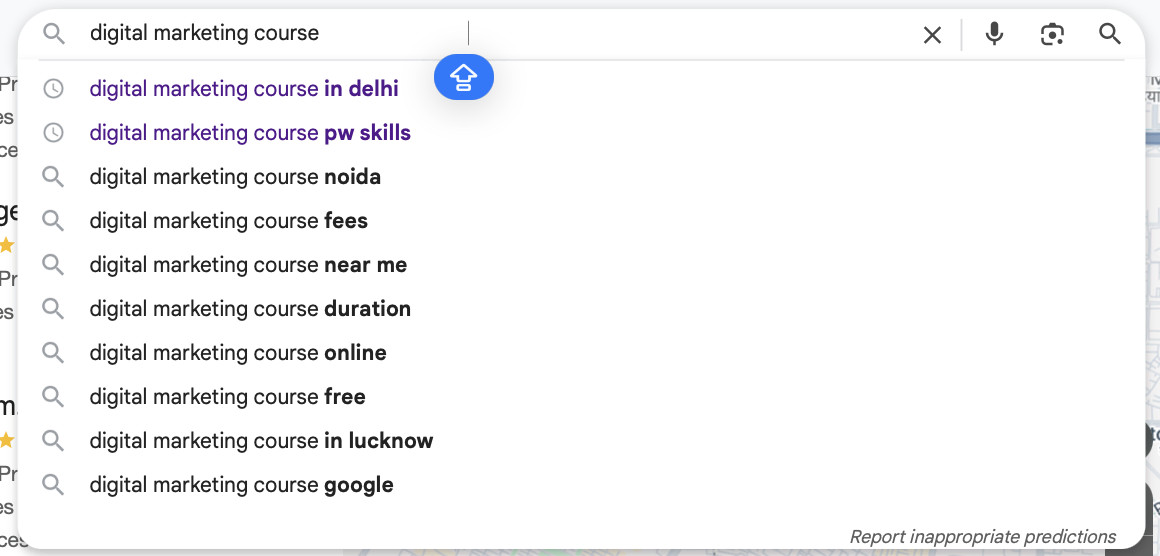
- You can create a list of keyword ideas from the Google search box suggestions, as these are popular queries used by people over the internet.
- Many online keyword research tools offer keyword clustering strategies; make sure you use one of them to get an effective clustering for your pages.
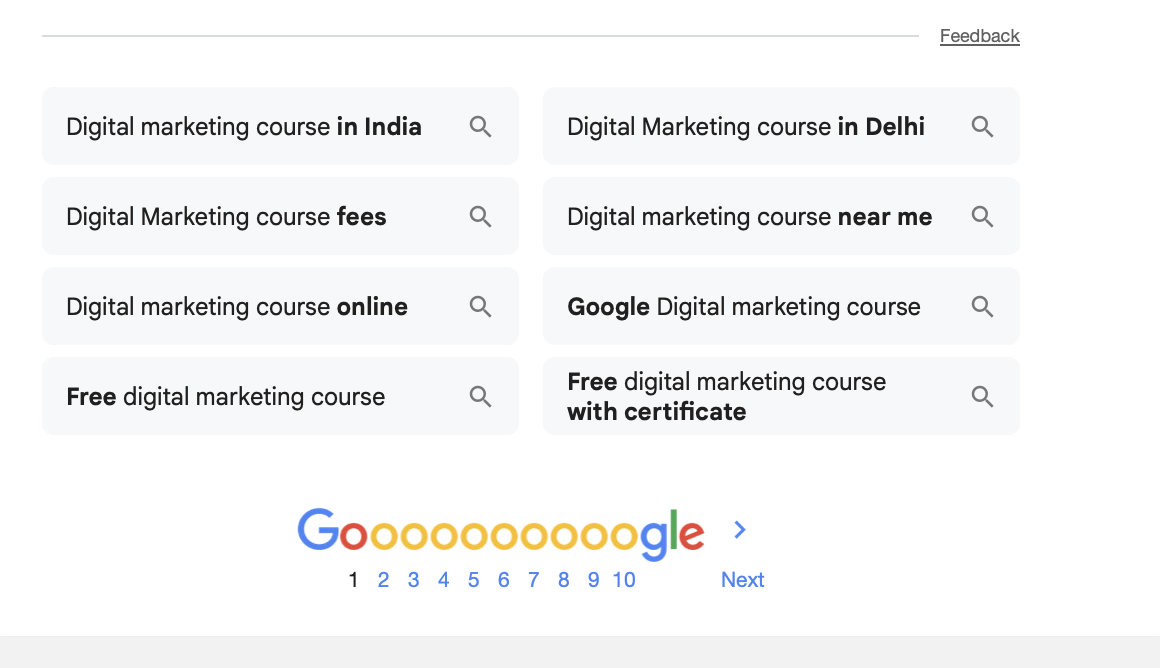
- You can also tap into the Related searches at the bottom of the search result pages and include them in your list.
- Make sure you do not use cross-intent keywords in the same content i,e. Informational keywords with navigational keywords or more
- Cluster your keywords based on search intent and SERP similarity.
- Keep count of the search volume and difficulty ratings for keywords you are clustering together.
Read More: What is Keyword Density? Is it Important for SEO?
How to Prepare A Keyword Clustering Plan For SEO?
Check the following step-by-step tutorial to understand how you can plan keyword clustering for your site.
1. Prepare a Keyword List
You will have to start with finding the set of keywords your audience might be more interested in. It is particularly the entry point through which your audience enters search engines. For example, If you are a platform offering a digital marketing course, you might start with the following keywords.
- Best Digital Marketing Courses
- Best SEO Course
- Digital Marketing Tools
- Best Digital Marketing Practices
2. Find Keyword Based On Topics
As your niche might be broad and hence you have to create a list of keywords that are relevant to your brand, businesses, or services you provide. You can start with “Google Keyword Planner” or “Semrush” to find the relevant terms.
Here is a little tutorial on how you can find keywords based on a particular topic on Semrush.

Here, you will have to select Broad match, and you will find good ranking keywords for your niche. Click on the “Search” button to start.
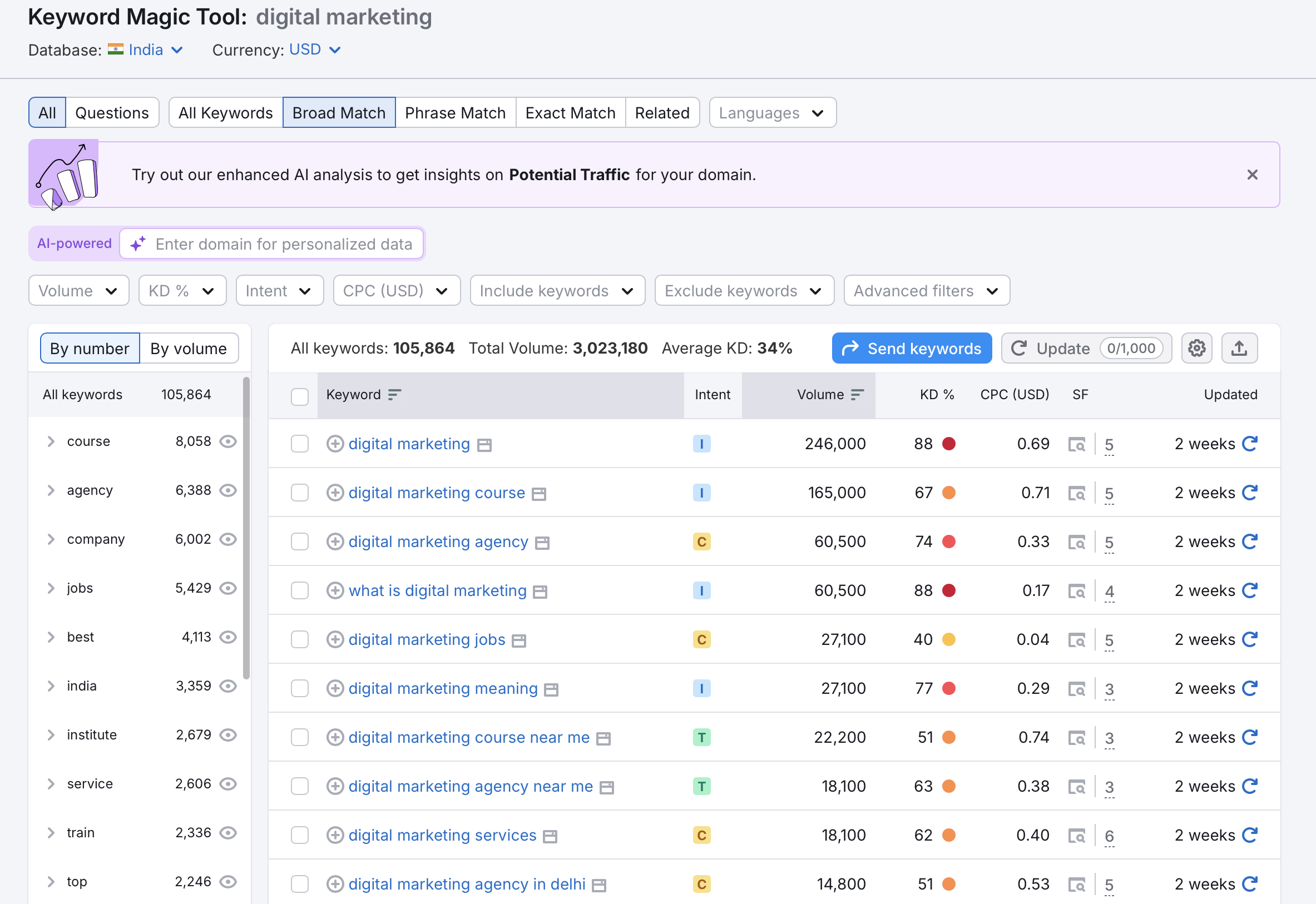
You can also explore different match ideas, including “exact match”, “phrase match”, and more on Semrush. On the leftmost side of the page, you can see that the keywords are arranged based on different topics.
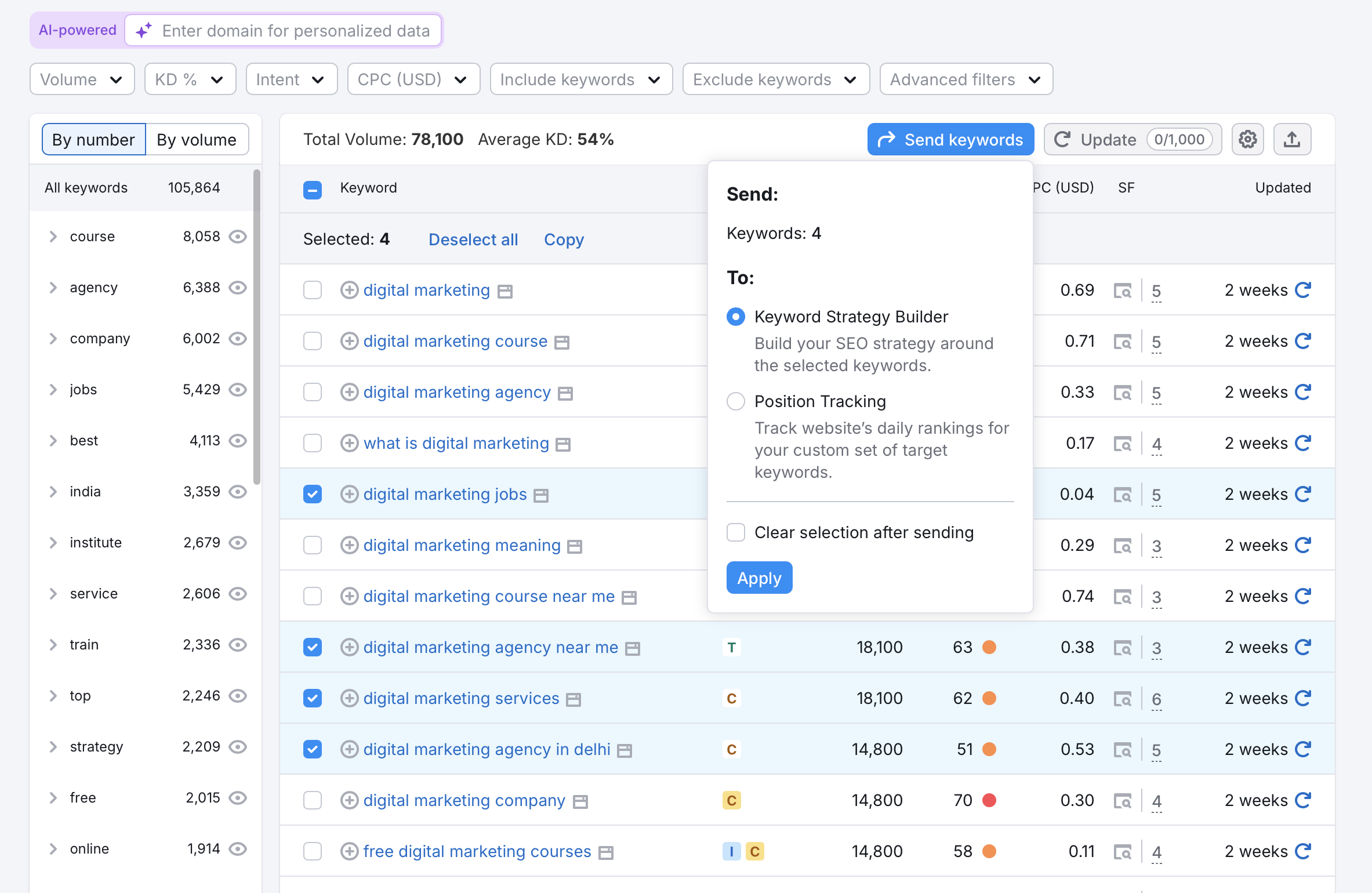
Moving ahead, you have to choose the “tick box” for keywords you want in your list and then select “Send Keywords” on the top right side of the page. Select “Keyword Strategy builder” and then “Apply”.
![]() Join Our Digital Marketing WhatsApp Channel
Join Our Digital Marketing WhatsApp Channel
3. Conduct Competitive Research For Potential Keyword Gaps
You can also prepare a keyword strategy based on your competitors. Find relevant keywords and then build clusters around to target your audience.

- Go to the “Organic Search” on Semrush and mention your competitor’s domain name.
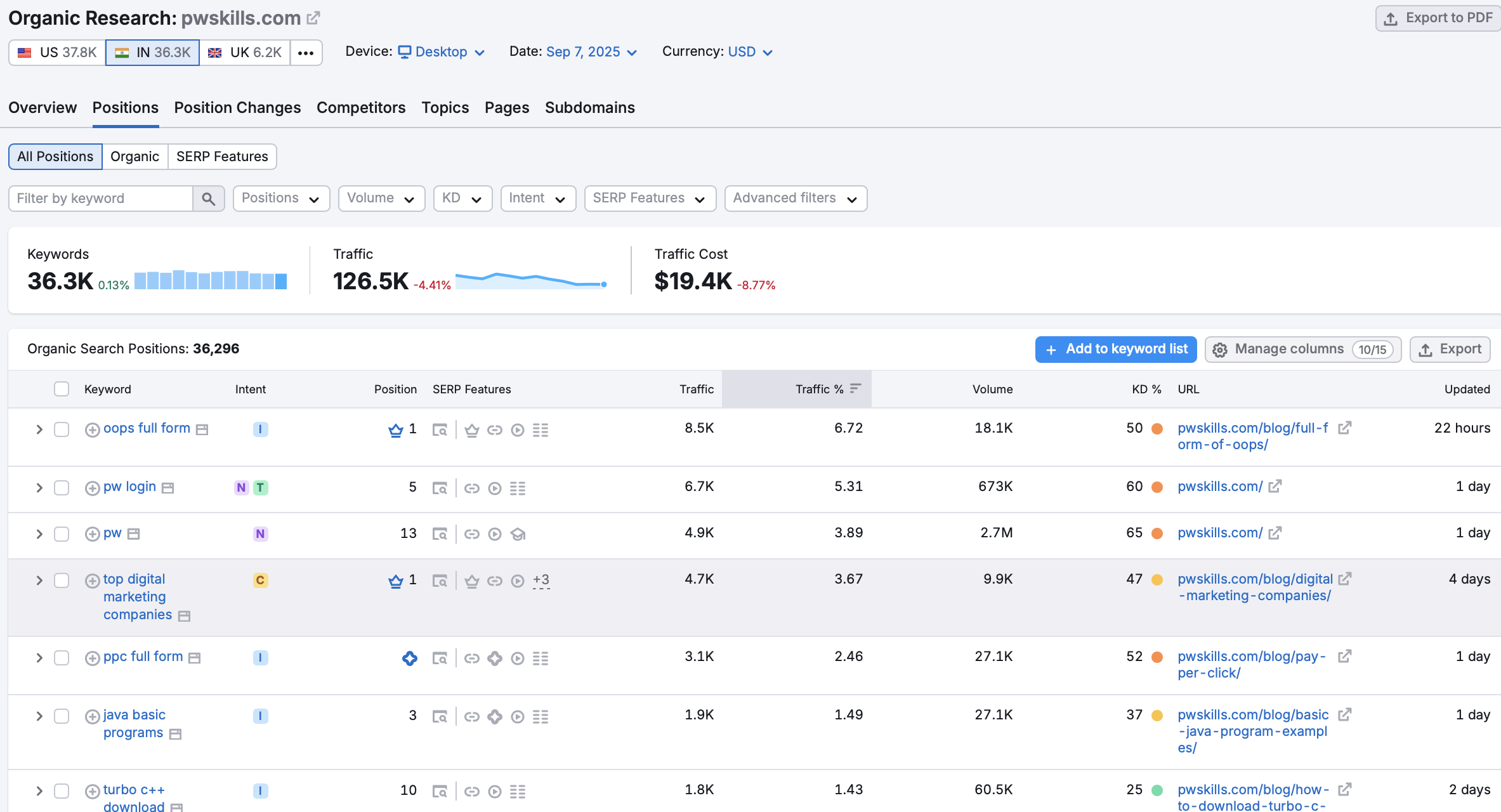
- Go to the “Positions” to find the ranking keywords of your competitor.
- Now, start selecting keywords from the list of keywords your competitor is using to rank, and create a cluster to start.
4. Define Your Keyword Category
While clustering keywords, it is important to ensure that the keywords you are targeting deliver the same search intent. There are four major categories of keywords considered in SEO practices.
-
- Informational: Learning Intent, such as benefits, drawbacks, location, service, and more.
- Navigational: Users are looking to find a specific webpage or site, such as “PW Skills Digital Marketing Course”.
- Commercial: Users are inclined towards making a purchase decision, such as “Best digital marketing course for SEO”.
- Transactional: Users are a long way ahead in the search journey and probably looking to complete a specific action, such as purchasing “buy digital marketing course”.
Make sure your clustering strategies do not intermix any two cross-categories, as it might create conflicts.
Also Read:
- What is Keyword Optimization in SEO?
- What is Keyword Density?
- What Are Branded Keywords?
- How To Do Keyword Research
5. Manual Clustering Works
You can also perform manual clustering for each term you saved from any keyword research tool. Make sure the keywords you cluster together follow certain metrics.
- If the same pages rank well for a specific group of keywords, cluster these keywords together.
- Content quality is important, and hence, cluster only those keywords that satisfy the intent and gain positive responses from users.
Learn Digital Marketing With PW Skills
Build your career in Digital Marketing with an AI-powered Digital Marketing Course offered by PW Skills. This course is suitable for newcomers, self learners, and business owners looking for digital growth of their business and building an online presence.
Get in-demand skills designed for today’s AI-driven landscape with optimised SEO, social media strategy, content creation, analytics, and more to build your career in digital marketing.
Looking for More?
- Get industry-led live sessions with professionals in digital marketing
- Build a fully job-optimised project portfolio which demonstrates your skills, and strengthen it with projects.
- Get opportunities for full-time jobs or freelance clients for different digital marketing tasks.
- Get personalised career assistance to prepare for interviews and land your dream job.
- Get industry-recognised certifications from PW Skills
- Enhance your job readiness with practical skills and expert career guidance.
Keyword Clustering FAQs
Q1. What is Keyword Clustering?
Ans: Keyword Clustering is an important part of SEO strategy, as it focuses on creating content that addresses a broader group of search queries.
Q2. Why is keyword clustering important for SEO?
Ans: Keyword Clustering focuses on creating content that addresses a broader group of search queries, increasing the chances of satisfying the search query and user intent with in-depth content.
Q3. What are the four types of keywords for SEO?
Ans: Informational keywords, Navigational keywords, Commercial keywords, and Transactional keywords are four major types of keywords for SEO.
Q4. Is there any tool for keyword clustering?
Ans: There are many SEO tools which can be used to perform keyword clustering, such as Semrush, Ahrefs, SurferSEO, and more.

